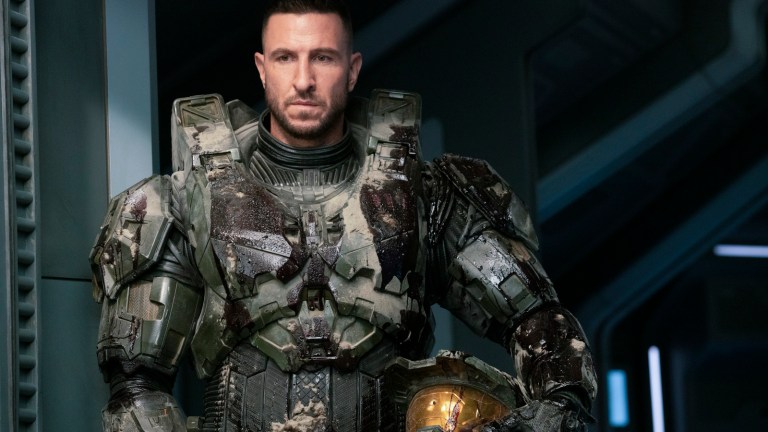Halo Episode 6 Review: Solace
A talky Halo episode puts more weight on its thin characterizations than they can handle.

This Halo review contains spoilers.
Halo Episode 6
After some fun action last week, a talky Halo episode puts more weight on its thin characterizations than they can handle.
The UNSC is on the hunt for the second alien artifact. It could lead them to the Halo ring, but no one is entirely sure what it is. The important thing: both sides, UNSC and Covenant, want it. After attacking Halsey, the Master Chief continues to test the limits of his newfound shackles. He endangers Halsey’s life to see what Cortana can do, stopping just short of killing the scientist.
In fact, it’s a Halsey-heavy episode, revealing her true motivations as her worst-case scenario comes true. UNSC’s Admiral Hood doesn’t see any of her projects, including the Spartans, as working out. Several machinations later, Paragonsky installs Miranda in Halsey’s place and puts Halsey in posh house arrest. Halsey is awaiting transport to an out-of-the-way lab where she’ll be able to technically continue her research while essentially having been disappeared by the UNSC. Halsey isn’t done scheming, though, recording Miranda’s voice during what the latter thinks is a heartfelt mother-daughter confrontation.
Meanwhile, Makee tells John where the Covenant have taken the second artifact. Repeat exposure to these artifacts can kill a human, apparently, or at least make them very sick. The planet she named turns out to be a wild goose chase, a stalling tactic while she tries to convince Chief to touch the artifact with her. He goes back to the artifact on his own, against Cortana’s misgivings. It turns out him touching it while in the same general area as Makee is enough. As Miranda discovered, they have a unique genetic marker that enables them to use ancient artifacts. John and Makee have a euphoric, shared vision of the titular Halo, a cloudy version of the iconic ring world.
The aesthetic continues to contrast gnarly peril (Kai’s injuries, Halsey screaming as she’s about to be radiation-burned) with Apple-esque clean lines. This isn’t the sort of humanized future that shows graffiti on the walls, or at least not in the UNSC. One of the first shots, Chief sitting with blood splashed across his armor, meshes the two worlds well. Chief still isn’t wearing his helmet very much, which saps some drama from scenes where his being faceless could have really added to the tension. (It’s also just not as cool to have him consistently carrying the mask around, and the games have more than proved that it’s possible to create sympathy for a faceless hero.) The costumes continue to look better and better, the Spartans understatedly alien next to their human allies.
Kwan and the Insurrectionist plot line are completely absent here. It’s a pity; her dynamic with Chief had a lot of potential. But the show simply doesn’t seem interested in the Insurrectionist arc any more.
Unfortunately, there aren’t really any aliens in this episode, either. After last week’s fun action scene, this episode is concerned almost entirely with humans talking to, spying on, or double-crossing each other. That pivotal final scene’s focus on Makee, the most underdeveloped character on the show, doesn’t really work, either.
Likewise, that central concept of who Chief really is as a person is a bit wobbly. Even threatening to kill Halsey in a particularly grotesque way doesn’t feel like a hard choice for him: instead, he’s trying to force Cortana into one. He’s forced to change minute by minute depending on the effects the artifact is having on his mind. While I understand the concept of breaking the character down to build him back up, this show’s approach simply isn’t very fun. I don’t mind the idea of talky sci-fi digging into unethical military experimentation. But Halo should have at least some element of space exploration and of Spartans being the ideal soldier (for good or ill), right? This also brings us back to Makee, who increasingly feels like a replacement for a more interesting alien character like the Arbiter. I just missed the games a lot while watching this episode, wanting to go back to the simpler adventures not because they were more simple, but because they were just more entertaining.
The relationship between Cortana and Halsey seems like one full of potential, although it could just end up repeating her arcs with Miranda and John. That said, my favorite thing about this show continues to be Halsey. Her motivation is a bit different here than in the main Halo timeline. In the games, the Spartans were her idea for military supremacy, a weapon of oppression that happened to exist at just the right time for humans to face an alien threat. But on the show, she spins this as a twisted bid at peace. “Natural evolution” is making humans too violent, she says, and Spartans are her way to fight “the status quo” and try to protect people from themselves. This, though, is less revealing than what she says to her daughter. Halsey tells Miranda “family is just not a concept I believe in.”
Olive Gray’s acting (look at Miranda’s joy at getting her own lab, mixed with a sort of nausea at seeing the clone’s cradle still installed) really helps this scene. Her disappointment at realizing her mother will truly never be able to be a mom to her is palpable. Halsey’s dialogue is a perfect mix of patronizing and apologetic, with seemingly endless rugs to pull out from under her daughter. Natascha McElhone continues to nail Halsey’s mix of dignity and cruelty, too. She’s “saving humanity at the cost of her own,” says Miranda. It’s a perfect summation of that character. Halsey continues to keep everyone around her on their toes, and the audience too — a brief shot of her sitting on the floor like a child while a UNSC camera drone watches her every move was particularly remarkable.
Of course, the center of the show is Master Chief. The nature of what the artifact did to him isn’t very clear except as unspecified illness. He’s a blank slate, yet filled with too much detail for the audience to project onto him like in the video game. This episode emphasizes both Chief’s importance to the cosmic struggle and his emptiness as a human being, and unfortunately, Pablo Schreiber just doesn’t have enough to work with to fill in the big gap in the middle. Too many people in this episode are walls or mirrors, even with the helmets off.
